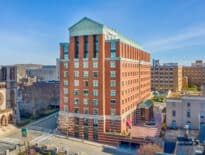
Gov. Maura Healey talks through details of her fiscal 2024 budget proposal at a State House news conference Wednesday March 2, 2023, which included her budget chief Secretary Matthew Gorzkowicz (right). Photo by Sam Doran | State House News Service
A long-sought downtown Boston rail link between the MBTA’s Red and Blue Lines, passenger train service in western Massachusetts and another study of low-income T fares headline transit areas of focus in Gov. Maura Healey’s first annual budget.
After taking office with the staffing, safety and reliability problems at the MBTA top of mind for riders and voters, Healey on Wednesday proposed steering $186 million in newly available surtax revenue toward the agency.
Those appropriations include $70 million for station improvements, $100 million to repair and rehabilitate MBTA bridges, and $11 million toward the design of the Red Line-Blue Line Connector, which would bring that project closer to reality decades after it was first floated.
The Red Line and Blue Line do not intersect anywhere along the MBTA’s core subway system, with the Red Line’s Charles/MGH stop and Blue Line’s Bowdoin endpoint coming within about half a mile of each other. That forces riders trying to get from one route to the other to walk or transfer to a third rail line or bus, slowing down travel or disincentivizing use of public transit altogether.
“We’ve had a look at all of our transportation projects right now,” Healey said Wednesday when asked about her proposal to fund design of the rail link. “The key focus right now is workforce, as you can imagine, but part of building a vibrant, functioning economy is making sure we have the vibrancy and the connectivity in our public transit system.”
She described her transportation secretary, Gina Fiandaca, as “very, very focused” on the project and others like it.
Fiandaca, in fact, has long been a fan of connecting the Red and Blue Lines. In 2019, when Baker administration officials announced they included the subway extension rather than a walking path in a long-term list of projects to be completed by 2040, then-Boston Transportation Commissioner Gina Fiandaca praised it as “a critical link serving East Boston, Cambridge and beyond.”
“This is music to our ears to hear this will be included,” Fiandaca said at the time.
Separate from surtax dollars, Healey’s $55.5 billion annual budget bill projects the MBTA will receive $1.463 billion in revenue from the state’s sales tax, an increase of $100 million over the fiscal year 2023 budgeted contribution, plus a level-funded state appropriation of $187 million.
Beyond that, the administration expects the beleaguered agency to lean on hundreds of millions of dollars in available but unspent resources it received under the Baker administration.
Healey said in her inaugural address that her “first budget will include funding to hire 1,000 additional workers focused on the operation of the MBTA within the first year of our administration,” taking aim at staffing shortages that have been forcing riders for months to contend with less frequent service and longer trips.
However, the fiscal year 2024 budget bill unveiled Wednesday does not direct any additional funding to the MBTA specifically for hiring 1,000 people. Healey’s office instead said she would file a supplemental budget bill in the near future “for new hiring and training supports for the MBTA” to meet the goal of bringing 1,000 more workers on board this year.
“The shift is there was one-time allotment of money toward the hiring, already, of 1,000 workers,” Healey said, referring to money lawmakers and former Gov. Charlie Baker agreed to steer to the T last year. “The good news is that is already part of what [the Department of Transportation] has within its disposal. We are focused on new money, though, that will go more on the recruitment side.”
Healey pointed to a trip she and Lt. Gov. Kim Driscoll took during Tuesday’s snowy weather to a MassDOT facility in Weston, saying they “wanted to thank the workers and also highlight, showcase, what they do and the careers available through our Department of Transportation.”
“That is going to require a particular, singular focus to recruit for the T a range of positions, and that’s where the new money is going to be important,” Healey said.
Federal investigators warned last summer that the MBTA is as many as 2,000 employees short of the workforce it needs to run at its former service levels, and the T for months has had a hard time filling open positions despite one-time funding injections.
Healey’s budget office said the T is currently operating with about 1,200 full-time employee equivalents below its budgeted headcount. Service cuts remain in place on the Red, Orange and Blue Lines, and reversing them now depends not just on dispatcher staffing, but also on train operator headcount and vehicle availability. Across the bus system, T officials said in the fall that they are more than 300 drivers short of what the budget calls for, and need another 440 or so to accomplish the vision for a multi-year 25 percent increase in bus service.
The budget also calls for using $12.5 million of surtax money toward the East-West Rail project that would expand passenger train service west of Worcester. That money would fund a project director at MassDOT, track improvements at the Pittsfield station and design of a station in Palmer.
In her annual spending bill, Healey also proposed using $5 million on “one-time expenses for exploring the feasibility of implementing a means-tested fare program” at the T.
Transit advocates have been pushing for years for the MBTA to roll out a widely available low-income fare option, and the idea has picked up momentum on several occasions but never gotten to the point of implementation.
The Legislature sought to mandate implementation of MBTA low-income fares in 2020, but Gov. Charlie Baker vetoed the measure in the dying hours of the two-year term, and the branches could not get on the same page last session.
“This is sort of an opportunity to get a toehold into that and to begin looking at means-tested fares. The thought is that this would probably ramp up over time,” said Administration and Finance Secretary Matthew Gorzkowicz.
In February 2022, MBTA staff projected that a system-wide means-tested fare program with eligibility set at 200 percent of the federal poverty level would cost $52 million to $85 million per year at existing service levels, or $72 million to $112 million when accounting for the likely increase in demand the option would generate.






